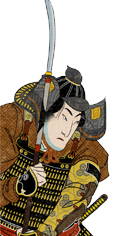
Basic Unit Statistics (can be modified by difficulty level, arts, skills, traits and retainers)
| Recruitment Cost | 220 | |
| Upkeep Cost | 100 | |
| Melee Attack | 5 | 14% |
| Charge Bonus | 10 | 20% |
| Bonus vs Cavalry | 15 | 50% |
| Melee Defence | 4 | 11% |
| Armour | 4 | 26% |
| Morale | 6 | 12% |
Strengths & Weaknesses
- Good against infantry and cavalry.
- Good morale.
- Large unit size.
- Weak against samurai infantry.
Description
These attendants are armed with long-bladed naginatas. Polearms give a skilled user a long reach during close-in fights.
Using naginatas to best effect requires training and dedication, as the long-bladed polearms require strength and co-ordination to use properly. Any idiot can swing a length of wood around, but to do this in the heat of combat and not decapitate yourself or a comrade takes practice. The attendants are a heavy infantry unit, and best used to carry the attack to the foe. They should be deployed in support of the more effective samurai, but can give a good account of themselves in their own right. They should not be positioned where massed ranks of archers can pepper them: arrows are no respecters of their targets' worth. Although numbering in the thousands, the armies of the Gempei War were largely made up of professional warriors; these were not peasants like the ashigaru of the later Sengoku Jidai period. Warriors were expected to have naginata skills to great effect, but the weapon took time to master. By the time of the Sengoku Jidai, however, vast armies were being raised and the best that many warlords expected from their men was relatively simple spear work. An ashigaru was expected to know how to set his spear to receive a charge, and to take part in the "push of pike" scramble of melee, but not to fight with the same level of skill as those who fought with naginatas.